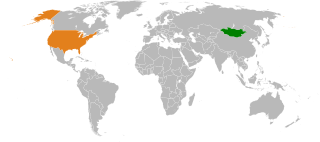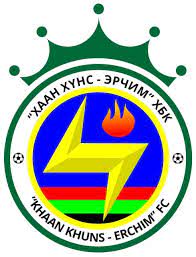
Mongolia is a landlocked country in East Asia, bordered by Russia to the north and China to the south. It covers an area of 1,564,116 square kilometres, with a population of 3.5 million, making it the world's most sparsely populated sovereign state. Mongolia is the world's largest landlocked country that does not border a closed sea, and much of its area is covered by grassy steppe, with mountains to the north and west and the Gobi Desert to the south. Ulaanbaatar, the capital and largest city, is home to roughly half of the country's population.

The economy of Mongolia has traditionally been based on agriculture and livestock. Mongolia also has extensive mineral deposits: copper, coal, molybdenum, tin, tungsten, and gold account for a large part of industrial production. Soviet assistance, at its height one-third of Gross domestic product (GDP), disappeared almost overnight in 1990–91, in the time of the collapse of the Soviet Union. Mongolia was driven into deep recession.

Ulaanbaatar is the capital and most populous city of Mongolia. It has a population of 1.6 million, and it is the coldest capital city in the world by average yearly temperature. The municipality is located in north central Mongolia at an elevation of about 1,300 metres (4,300 ft) in a valley on the Tuul River. The city was founded in 1639 as a nomadic Buddhist monastic centre, changing location 28 times, and was permanently settled at its modern location in 1778.

Buyant-Ukhaa International Airport, formerly called Chinggis Khaan International Airport from 2005 to 2020, is a semi-operational international airport serving Ulaanbaatar, Mongolia, situated 18 km (11 mi) southwest of the capital. Largely replaced by a new airport, it currently functions as a backup airport for the former, with a view to being used for flight training as well as for special, charter, and government flights.

Hohhot, formerly known as Kweisui, is the capital of Inner Mongolia in the north of the People's Republic of China, serving as the region's administrative, economic and cultural center. Its population was 3,446,100 inhabitants as of the 2020 census, of whom 2,944,889 lived in the metropolitan area consisting of 4 urban districts plus the Tumed Left Banner.

The Mongolian People's Party (MPP) is a social democratic political party in Mongolia. It was founded as a communist party in 1920 by Mongolian revolutionaries and is the oldest political party in Mongolia.

The prime minister of Mongolia is the head of government of Mongolia and heads the Government of Mongolia. The prime minister is appointed by the Mongolian parliament or the State Great Khural, and can be removed by the parliament with a vote of no confidence.

The national flag of Mongolia is a vertical triband with a red stripe at each side and a blue stripe in the middle, with the Mongolian Soyombo symbol centering on the leftmost stripe. The blue stripe represents the eternal blue sky, and the red stripes thriving for eternity. The Soyombo symbol is a geometric abstraction that represents fire, sun, moon, earth, water, and a symbol representing two fish as in Mongol mythology fish never sleep thus symbolizing that the spirit of the Mongol people never sleeps.
MIAT Mongolian Airlines is the state-owned national airline of Mongolia, headquartered in the MIAT Building in the country's capital of Ulaanbaatar. The airline operates scheduled services from its base at Chinggis Khaan International Airport in Sergelen, near Ulaanbaatar.
The Mongolia national football team represents Mongolia in international football and is controlled by the Mongolian Football Federation.

The president of Mongolia is the executive head of state of Mongolia. The current president is Ukhnaagiin Khürelsükh.

The current Constitution of Mongolia was adopted on 13 January 1992, put into force on 12 February, with amendments made in 1999, 2000, 2019 and 2023. The constitution established a representative democracy in Mongolia, enshrining core functions of the government, including the separation of powers and election cycle, and guaranteeing human rights including freedom of religion, travel, expression, private property. The document was written after the Mongolian Revolution of 1990, effectively dissolving the Mongolian People's Republic.

Bilateral relations between Mongolia and the United States formalized in 1987 with the establishment of diplomatic relations. Since then, the United States has become a key third neighbor to Mongolia, and in 2019 this relationship was upgraded to a strategic partnership. Ties focus on education, development assistance, and defense.

Lesbian, gay, bisexual, transgender, and queer (LGBTQ) people in Mongolia face legal and social challenges not experienced by non-LGBTQ people, though there have been substantial improvements since the 1990s. Homosexuality was criminalised in Mongolia in 1961 through its Criminal Code. Following the Mongolian Revolution of 1990 and the peaceful transition to a democracy, homosexuality was legalised and awareness about LGBTQ people has become more prevalent. Hate crimes on the basis of sexual orientation and gender identity result in additional legal penalties. Hate speech based on these two categories has been outlawed in the country since 1 July 2017. Households headed by same-sex couples are, however, not eligible for the same legal protections available to opposite-sex couples.

Khaan Khuns-Erchim Football Club is a professional football club from Ulaanbaatar, Mongolia who have been playing in the Mongolian Premier League, which they have won ten times, since its inaugural year in 1996. The Mongolian Football Federation applied to enter the 2012 AFC President's Cup, and was approved by the AFC in November 2011. As winners of the 2012 Super Cup, Erchim were awarded the place in the competition.

Chinggis Khaan International Airport, also referred to as New Ulaanbaatar International Airport, is the primary airport serving Ulaanbaatar, and is Mongolia's only international airport. It opened on 4 July 2021, replacing Buyant-Ukhaa International Airport.

Khaltmaagiin Battulga, also referred to as Battulga Khaltmaa, is a Mongolian politician and sambo wrestler who served as the 5th President of Mongolia from 2017 to 2021. He served as Member of the State Great Khural from 2004 to 2016 and Minister of Roads, Transportation, Construction and Urban Development from 2008 to 2012. Before his career in politics, Battulga was a sambo wrestling champion. He was the Democratic Party's candidate in the 2017 presidential election and was elected President with 50.6% in the run-off, the first-ever run-off election in modern Mongolian history. Mongolians are divided about his role in the 2019 Mongolian constitutional crisis. He was elected as a Member of the State Great Khural for the fourth time in the 2024 parliamentary election.

Mongolia is participating in the 2018 Asian Games in Jakarta and Palembang, Indonesia from 18 August to 2 September 2018. Mongolia made its first appearance at the Asian Games in 1974 Tehran, and have a total 137 medals, including 20 gold, 37 silver, and 80 bronze. At the previous edition in Incheon 2014, Mongolia had collected 21 medals, and standing in the 16th position in medals tally.

The Hu is a Mongolian folk metal band formed in 2016. Incorporating traditional Mongolian instrumentation, including the morin khuur, the tovshuur, and throat singing, the band calls their style of music "hunnu rock", a term inspired by the Xiongnu, an ancient nomadic empire based in Mongolia proper, known as Hünnü in Mongolian. Some of the band's lyrics include old Mongolian war cries and poetry in the Mongolian language.

Mongolia competed at the 2020 Summer Olympics in Tokyo. Originally scheduled to take place from 24 July to 9 August 2020, the Games were postponed to 23 July to 8 August 2021, because of the COVID-19 pandemic. Since the nation's debut in 1964, Mongolian athletes have appeared in every edition of the Summer Olympic Games, with the exception of the 1984 Summer Olympics in Los Angeles, because of its support of the Soviet boycott.













